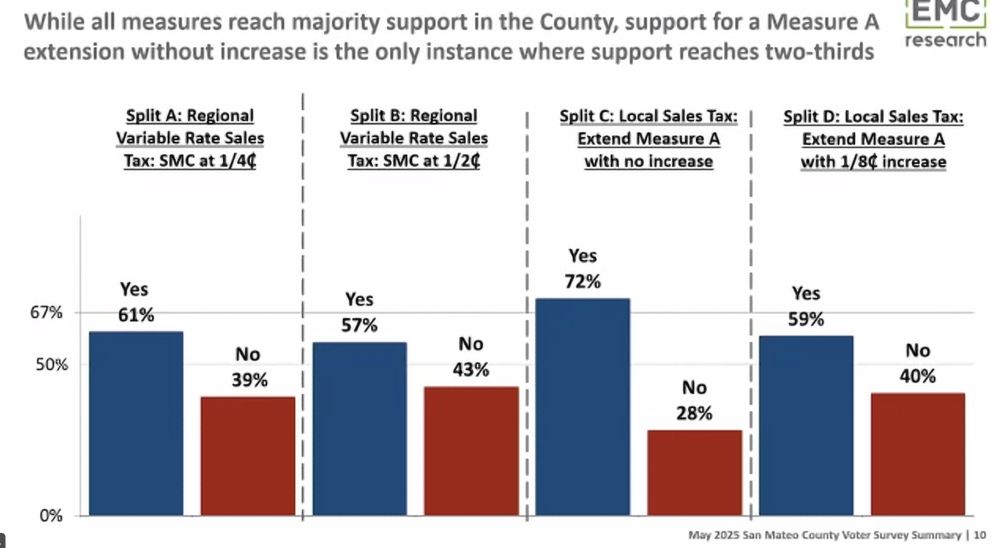On July 2, the SamTrans board heard information about new polling that drew more board members to lean toward support for participation in a potential regional transportation funding measure.
The polling compared options for joining the regional transit funding measure (which enables a citizens’ initiative that can pass with over 50% of the vote), or early reauthorization of the local Measure A transportation sales tax which expires in 2033, which would require a two thirds vote.
Regional measure looks viable, but a local measure would require big sacrifices
Polling showed that joining the regional measure was viable at the 50% threshold, and joining at the half-percent sales tax would do better at delivering the outcomes voters want.
While the polling showed that reauthorizing Measure A at the current level would exceed two thirds of the vote, trying to shoehorn regional transit funding into the expenditure plan would require cannibalizing pothole repaving and other popular capital investments, or would lead to unpopular cuts to regional transit services.
The polling also dispelled misconceptions that some board members had held regarding voters preferences about the regional transit system.
Contrary to the prior beliefs of several board members, San Mateo County voters strongly favor funding BART (at 79%), in addition to Caltrain and SamTrans (84% and 82%). This result is consistent with previous polling from MTC, where San Mateo County voters supported a regional measure with BART mentioned as the first word in the poll question. On Wednesday, SamTrans board members acknowledged this with a county-specific poll.
The new polling also was persuasive to some previously skeptical board members about the high value voters place on regional coordination. In addition to continuing to fix potholes and improving street safety, voters want to improve transit coordination and prevent transit cuts at over 80%.
In addition, contrary to the previous beliefs of some locally oriented board members, voters do not believe that local control is the best way to manage and coordinate regional transit.
And, contrary to the previous concerns of some board members, voters see little difference between a 10 and 11% tax rate, although voters do show negative sentiment about increasing taxes in general. The pollster explained that it is not uncommon for voters to be leery of tax increases in general, but also supportive of particular purposes like fixing potholes, saving and improving transit service.
Board members continue to have a strong preference for a regional measure to allow funding over and above the amount needed for the regional transit services and transit coordination to be provided to the county as “return to source” for local needs to prevent SamTrans deficits, protecting SamTrans service, supporting transit priority and other local projects such as protecting bus depots from sea level rise.
A few board members expressed a preference for a business gross receipts tax rather than a regressive sales tax, since recent polling conducted by labor groups showed favorable poll results, but the board members also expressed concern about whether the timing to make a change would be feasible.
The board members expressed their leanings but didn’t vote on July 2 except on provisions for negotiations about provisions to fund Caltrain (will blog this separately).
The next important meeting for San Mateo County’s decision is the San Mateo County Transportation Authority board, which meets on Thursday, July 10. The SMCTA board will discuss the polling on July 10, but not yet vote on its recommendation.
The SamTrans board is slated to vote on its recommendation August 6, after the Caltrain board discusses the Caltrain funding provisions on July 23, and after recommendations from the San Mateo County Transportation Authority and City/County Association of Governments on July 30.

